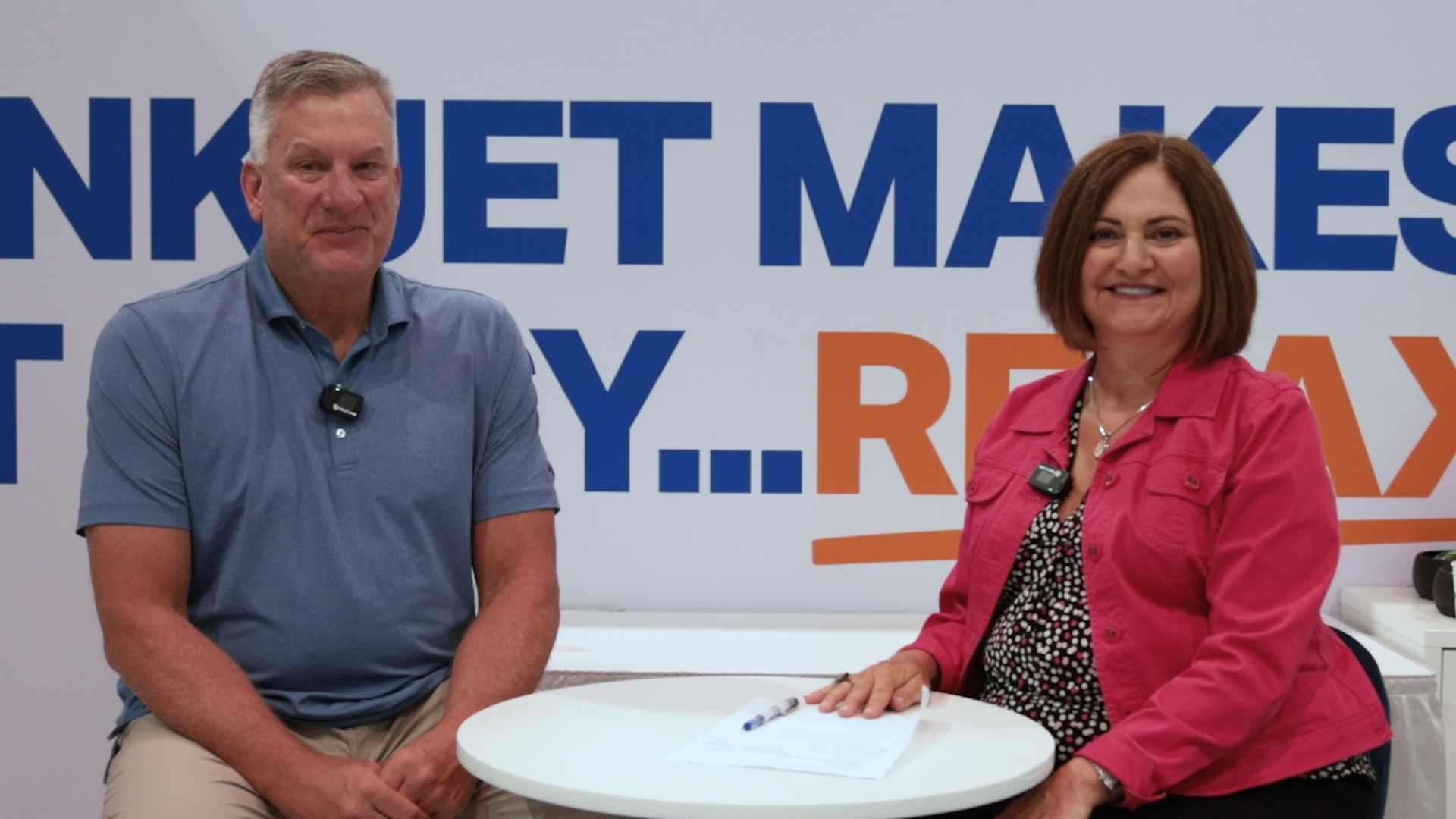Commentary & Analysis
Displaying 5651-5750 of thousands of articles
Insight You Need. Analysis You Trust.
Get the trusted insights you need to understand our evolving industry and emerging trends. Become a Premium Member.
AlphaGraphics Acquired by Blackstreet Capital
Now that the dust has settled a little on the acquisition of AlphaGraphics (AGI) by Blackstreet Capital and CEO Kevin Cushing’s unexpected departure, Art Coley, AlphaGraphics’ Interim President, talks to WhatTheyThink Senior Editor Cary Sherburne about the AGI perspective, future prospects and franchisee reaction.
Expect a Stepped-up Pace of M&As in 2012, for All the Right Reasons
No matter what is happening to other print industry metrics, M&As are trending up. This can be to the advantage of many printing companies seeking growth or a path to staying in operation.
Drupa 2012, the Inkjet Drupa…again? A closer look at Fujifilm
In this sixth article of the series, David looks at Fujifilm, its production inkjet offerings and applications.
manroland Sheetfed Division Being Acquired
Andy Tribute takes a look at Langley Holdings which recently acquired the manroland sheetfed division.
Data-Driven Marketing: Building Better Relationships
In today’s market, data-driven personalized marketing has never been more important. Every buyer has his or her individual needs, preferences, resources, and behaviors. Since it is virtually impossible to cater to each customer’s individual characteristics, marketers attempt to group customers into market segments by variables they have in common. This article provides a discussion of service providers that are using market segmentation to improve their business results.
Gerhardt and Marcantonio on Allegra's Acquisition of Signs by Tomorrow
Cary Sherburne, WhatTheyThink’s Senior Editor, had a few questions for Allegra’s Carl Gerhardt and Mike Marcantonio about this acquisition. Here’s what they had to say.
SpyderLynk’s SnapTags Strive for Acceptance
There’s a notable gap between consumers’ understanding of QR codes and their willingness to use them. A company called SpyderLynk has a solution aimed at helping image-based mobile marketing to fulfill the potential that has eluded QR codes.
Driving movable data in the right direction
“Printing using movable type” has turned into “printing using movable data”. It has been almost eight years since Bernhard Schreier, CEO of Heidelberg, paraphrased Gutenberg’s invention to describe the transformation of the industry. And data has been moving ever faster, in ever more directions, ever since.
Fenske Media: Innovative and Growing
In December, WhatTheyThink’s Senior Editor, Cary Sherburne, joined a number of her press and analyst peers on a visit to Fenske Media in Rapid City, South Dakota. In this article, she shares details about the event and includes an exclusive interview with Tom Fenske, one of the four brothers that own and operate the business.
AlphaGraphics Has a New Owner
Rumors that AlphaGraphics was on the blocks proved to be true when the company announced it had a new owner. Senior Editor Cary Sherburne spoke to CEO Kevin Cushing to get the story behind the story for our readers.
Business at the Speed of NOW: Implications for the Printing Industry
In December 2011, John M. Bernard published a book entitled Business at the Speed of Now: Fire up Your People, Thrill Your Customers, and Crush Your Competitors. The book states that the ability to understand emergent issues and act upon them with appropriate speed will mark the difference between the winners and losers. This article provides examples from the book and explains how they can be applied to the printing industry.
Océ Business Services Partners with Mimeo to Deliver Océ PrintExpress
Océ Business Services introduced Océ PrintExpress, an online print and distribution service that augments its Managed Print Services offerings. Senior Editor Cary Sherburne speaks with Océ Business Services and its partner, Mimeo, to get the scoop.
Future-cast: New Directions for Digital Print
The digital printing industry looks to Caslon and PODi for insights into what’s next and what will be profitable in the future. Here are a few of the exciting opportunities we see emerging plus some red flags to watch out for.
Kodak, Does it Have a Future?
The big news of the past few days has been that Kodak has filed for Chapter 11 bankruptcy protection in the USA. The announcement from Kodak was not unexpected as the company has been having financial problems for some time, and had appointed a specialist consultancy company late last year to evaluate bankruptcy protection options.
Welcome Back: I Was Wrong
Dr. Joe is back and he admits he was wrong. There's a season for everything, it turns out, but not the same ones there used to be. He explains how to be a hit at cocktail parties, and then wonders why we should care about economic forecasting, if at all. Sounds like he's been away from the WhatTheyThink pages a little too long...
Kodak Means to Stay the Course in Graphic Communications Throughout Chapter 11 Reorganization
Kodak will continue to advance its graphic communications business as it tries to emerge from bankruptcy, treating its digital printing, plate, and workflow operations as keys to survival and future success.
Running the Gauntlet: A Book Review
Jeff Hayzlett’s second book, Running the Gauntlet, is out, launched January 3rd. Read what Senior Editor Cary Sherburne has to say about the book and the SnapTags it incorporates.
Looking for an Expert
Across all industry segments, marketers are challenged with understanding how to effectively leverage cross-media communications and build out effective campaigns. This article explains how Darwill has transformed its products and services into real customer value in the non-profit and association markets.
Cool App from a Surprising Source
Web-to-print provider Aleyant profiled one of its customers in a recent press release that caught my attention. Thinking this was an innovative print service provider who had launched a niche holiday application, I contacted them to see what they do the rest of the year. Not a print service provider!
Will Newspapers Ever Use Digital Printing?
One of the areas where major future business growth is seen is in newspapers adopting high-speed inkjet printing as an alternative or replacement for offset printing. The various press vendors all specify newspapers as a key business area for them for the future. Yet when one looks at the market newspapers have just not moved in any way to adopt the technology.
Cathedral Corporation: Portrait of a Printing Company with M&A in Mind
Technical innovation and customer care are the main ingredients in the recipe for growth at Cathedral Corporation, which now aims to accelerate its expansion with the well-planned acquisition of another printing firm. President and CEO Marianne Gaige describes her objectives in this interview.
Latex Ink Jet Technology Goes Mainstream
Latex ink jet ink technology was introduced by Hewlett-Packard in 2008 for wide format graphics printing applications, and after an extended period of beta-testing and an economic recession it went mainstream in 2010. During the last 18 months in particular unit placements have continued to gain strength, now totaling over 10,000 placements wordwide at the end of 2011.
It’s 2012… and the Transformation of the Printing Industry is Happening NOW!
It’s a brand new year and a great time for predictions about what the future holds for the production printing market. This article outlines InfoTrends’ top seven predictions for 2012 related to digital technologies within the printing industry.
Pressroom Chemistry Gets Green
As printing companies move towards environmentally friendly processes and products they must sort through the misinformation in the marketplace. This article helps to educate the printer on what to look for in pressroom chemistry.
Drupa 2012, the Inkjet Drupa…again? A closer look at Ricoh
This series by David L. Zwang focuses on current production inkjet products and their application in the market today. In this fifth article of the series, David looks at Ricoh, its production inkjet offerings and applications.
Why HP Acquired HiFlex
On December 7th, HP announced the acquisition of print MIS provider HiFlex. WhatTheyThink Senior Editor Cary Sherburne spoke with HP to understand more about this acquisition and how it fits into the HP portfolio. You may be surprised to learn where the acquisition is reporting within the HP organization.
Boarman Out as Public Printer
On April 15, 2010, President Obama announced his intent to nominate William J. Boarman as the 26th Public Printer of the United States. Following that announcement, WhatTheyThink covered the long, and ultimately unsuccessful confirmation process, revealing a number of problems with the nominee. Apparently more problems have arisen and his nomination was returned to the President. Read more.
The day the typesetting industry died
There will always be a printing industry, but it will be different than it used to be. Typesetting did not go away; it just moved to a different place.
J Press 720 Moves Beyond the Showroom
Fujifilm first announced the J Press 720 in 2008, with much press and fanfare for the new sheet-fed, digital inkjet press. In 2010, at GRAPH EXPO, it was shown in action. Now, the first machine has been installed in Michigan. What does the J Press 720 mean for Fujifilm?
First Coated Stock for Production Inkjet Introduced by NewPage
NewPage was the first paper manufacturer to bring to market a coated stock optimized for production inkjet. Availability of an affordable coated stock solution is at the top of the wish list for many production inkjet press owners. We expect to see much more activity in this space between now and drupa. In the interim, Senior Editor Cary Sherburne spoke with the folks at NewPage to get the full story.
Drupa 2012, the Inkjet Drupa…again? A closer look at Océ
In this fifth article of the series, David looks at Océ, its production inkjet offering and applications.
Is MIS Going into the Cloud?
There were two interesting announcements made by major suppliers last week. These were both in the area of MIS systems for printers. One might ask what is the attraction of acquiring an MIS company?
The Full Package
With an estimated 75% of all retail products purchased on impulse and over 40,000 different lines in a supermarket outlet from which to choose, attention-grabbing packaging print is the crucial differentiator on-shelf and ways to achieve this will be emphasized at drupa 2012, reports Des King
Wild Apple Graphics Turns to Digital Printing for Art Prints
Wild Apple Graphics recently added a new digital press that allows the company to offer short runs of certain popular print sizes. Cary Sherburne spoke with Jim Chadwick, Director of Technical Services, to understand how digital printing is streamlining the company’s art print business and why they chose the digital press they purchased.
Work smarter – not harder
As the possibilities and the range of applications in the world of printing, including digital, continue to expand, the manufacturers of finishing machines are having to keep pace by delivering continual innovations.
Mobile… The Fundamentals Still Apply
In November 2011, InfoTrends published a multi-client study entitled Mobile Technology: Making Print Interactive. This research was conducted to determine the importance of combining technologies to activate, cultivate, and engage customers. While marketers and service providers often get enamored with technology the fundamentals of good marketing still apply today. This article discusses the basic elements of quality marketing campaigns and provides some real-world examples.
InterQuest: Private Sector Talent Transforming Government In-plants
This sixth annual InterQuest continued the theme of most all printing conferences for the last decade: digital printing and electronic workflows must be in your future. This DC gathering featured successful case studies by the general managers that led their transition.
If You Want a Slice, Bring Your Own Pie
If you’re walking around trying to push your products and services on potential customers, you’re asking them to give you a slice of their pie (their business). This is a hard sale because you’re dipping into a limited resource.
InterQuest 2011: Need for Benchmarking at Federal Government In-plants
The sixth annual InterQuest conference targeting government and higher education in-plant printers was held November 30. Digital printing, electronic workflows, and in-plant case studies of successful technology and management transitions often involving newly hired, experienced private sector employees were the reenforced themes of the forum.
SGIA: More Than Ink on Paper
SGIA was flooded with small ink, roller, blade, and other screen consumable suppliers: How do so many analog screen suppliers hang on? The simple reason: screen output remains cheap-and turnaround is fast enough.
Online marketing resource centers for dealers
To promote sales of their products, manufacturers need to effectively provide their network of dealers with marketing materials that support the purchase process, and continue the post-purchase conversation.
Litho & Digital – A Complementary Mix
Today it is becoming much more common to find printers using more than one printing technology. In most cases this is adding sheet fed digital printing to complement a predominantly offset printing operation.
Mobile… It’s Part of Your Future!
Mobile technology is playing an increasingly important to today’s society. Despite the growing importance of mobile, all channels (print, mobile, social, online, mass media) must be a part of the marketing mix. This article provides a brief overview of how mobile can be integrated with other media types to become more effective, citing research from a recently completed study from InfoTrends
Andy Tribute on manroland's filing for insolvency
The major news in the past week has been German press manufacturer manroland filing for insolvency. This is the largest corporate failure in Germany for two years.
Drupa 2012, the Inkjet Drupa…again? A closer look at Xerox
In this fourth article of the series, David looks at Xerox, its production inkjet offering and application.
Touchcode: A New Way to Make Print Interactive
German firm Printechnologics has developed another way for print to be interactive utilizing the increasing number of touch screens—tablets, smartphones and more—now in the marketplace. What is a Touchcode, how can it be used and when might we start seeing them in the market? Cary Sherburne speaks with Printechnologics CEO Sascha Voight.
Drupa 2012, the Inkjet Drupa…again? A closer look at Kodak
In this third article of the series, David looks at Kodak, its production inkjet offerings and applications.
Making a Big Impression Trends in Large Format Printing
As we approach drupa 2012, what are the technologies we can expect to see that will drive change in the printing and publishing markets? Once again, we can expect to see a significant position for inkjet in the array of new technologies exhibitors have on display. This time, however, while there will still be a large presence in the production sector.
The future of graphic communication education
The Pennsylvania College of Technology in Williamsport, PA just discontinued their Graphic Communication Technology major. The decline in enrollment began in 2001 and only four new students entered the major in the more recent term.
CMO Perspectives: From Stretched to Strengthened
In October 2011, IBM published a C-suite study report entitled From Stretched to Strengthened. In this article, Barb Pellow highlights some of the key findings from this study and also discusses best strategies for next-generation service providers.
Environmental Aspects of Printing Inks
As printing companies move towards environmentally friendly processes and products they must sort through the misinformation in the marketplace. This article helps to educate the printer on what to look for in printing ink.
AlphaGraphics Seattle Finds Success in Search Engine Marketing
Printing firms today face many challenges and opportunities. Entrepreneurs like AlphaGraphics Owner Chuck Stempler provide examples of what the printing firm of the future might look like and offer services to small commercial and quick printers to help them reach their own goals.
Cross-Media Services Success… A Natural Evolution at GLI
This document provides an overview of how Great Lakes Integrated (Cleveland, OH) is making the shift to cross-media marketing services. The 80-year-old company established its reputation in the marketplace decades ago by providing exceptional printing quality and service. Because today’s businesses are facing unprecedented competition, GLI has revitalized its capabilities to deliver comprehensive, integrated, state-of-the-art marketing solutions.
Who Will Supply Ink for Inkjet Presses?
With the arrival of high-speed inkjet presses that challenge offset printing in many areas, one of the comments I regularly hear concerns the cost of inkjet inks and why one cannot buy inks from a range of suppliers, as one can for offset printing. Well things may be changing and this can be seen from the lawsuit in which Kodak is taking action against ink manufacturer Collins Ink Corporation alleging breach of contract.
Is There an iPad App in Your Future?
As we look at ways to ensure that print remains viable and that we have the right set of services to go with it, becoming an iPad app developer is an interesting avenue to explore that may be easier than you think. Cary Sherburne reviews two options for easy entry into this market.
Drupa 2012, the Inkjet Drupa…again? A closer look at HP
In this second article of the series, David looks at HP’s production inkjet offerings and applications.
Lessons from Steve Jobs
Steve Jobs' passing created interest in his management style and the culture of the company he left behind. What management lessons apply for other businesses? Is print a commodity? Can print campaigns be too successful for their own good? One printer blamed its disappointing financial results on that very fact.
What will be the theme for drupa 2012?
Previous drupa's have been defined by a dominant technology trend, last time in 2008 it was the inkjet drupa and prior to that the show has been defined as the JDF drupa, the digital drupa, the CTP drupa and others further back in the mists of time.
It’s Time to Get Social!
Barb Pellow recently interviewed John Foley, Jr. (Grow Socially), Aaron Rains (Printing Center USA), and Ron Rescigno (Rescigno’s Market Connections). This article describes how these early adopters are effectively using social media in the world of print and marketing services.
The End of Communication As We Know It
In the last ten years or so our business has so fundamentally changed as to be almost unrecognizable to former participants and past industry giants. No one in our industry no matter what their title performs the function that their predecessors performed not ten years ago nor five years ago.
For Three Firms That Grew by Acquisition, the Art of the Deal Came from the Guidance of Their Professional M&A Advisors
Even experienced fishermen know that there are times when they shouldn’t cast a fly without the help of a fishing guide. A guide knows where the best fishing holes are and how to land the prize fish in them. It’s much the same with mergers and acquisitions in the printing industry. The best catches are made when the principals rely on the skills of deal-savvy M&A advisors.
Alleging Breach of Contract, Kodak Files Suit Against Collins Ink
The commercial dispute between Kodak and Collins Ink Corporation has escalated into a legal wrangle with Kodak’s filing of a lawsuit that charges the inkjet ink manufacturer with breach of contract.
Print: Driving Excitement at the Point of Purchase
In June 2011, InfoTrends completed its Who Buys Wide Format? study, which was designed to collect more information about the buyers of large format products. It fostered an understanding of wide format graphics buyer requirements while also tracking changes in buying patterns since the previous study from 2009. This article discusses key findings from that study and also provides real-world examples of retailers that are interacting with consumers at the point of purchase.
Ideas that Work: Drive retail store traffic with viral sharing of discounts or coupon
One of the key issues for all retailers is how to get more traffic to their store or restaurant. Dave takes a look at a recent direct mail campaign from Chick?fil?A.
Looking Back on Graph Expo 2011
Graph Expo is an important event to our industry. In the last few years the show has evolved to address industry changes and economic conditions. Today Graph Expo is more valuable than ever as a place to interact with peers and determine where our industry is headed.
Drupa 2012, the Inkjet Drupa…again?
This new series by David L. Zwang will focus on current production inkjet products and their application in the market today. This series will run every 3 weeks leading up to Drupa 2012. He will look at the current vendor product offerings, and how they are being used by some of their showcase customers. In this first article of the series, David discusses some background on drivers and obstacles to mainstream adoption to production inkjet.
Promising to Protect Customers, Kodak and Collins Ink Corp. Part Ways
With each vowing that customers won’t be harmed as a result of their estrangement, Kodak and Collins Ink Corporation have come to the abrupt end of a 10-year deal whereby the latter supplied the former with inkjet inks for Versamark digital presses.
Have We Crossed the Chasm for Cross-Media Marketing Services?
In the 1991 book entitled Crossing the Chasm, Geoffrey Moore creates a revised adoption life cycle for technologies consisting of Technology Enthusiasts, Visionaries, Pragmatists, Conservatives, and Skeptics. Moore identifies some key steps for successfully crossing the chasm in the high-tech market, and successful cross-media service providers are following some of these very steps to increase their profitability. This document outlines Moore’s suggestions for success and explains how they apply to the cross-media market.
Kodak President & COO Phil Faraci Clarifies Kodak Position
Recent news stories about Kodak have implied that the company’s digital transition is not going as planned, even suggesting an investigation into filing bankruptcy. While waiting for Kodak to announce quarterly earnings on November 3rd, WhatTheyThink spoke with President & COO Phil Faraci to gain his perspective these issues.
TRI-C Enterprises CEO and PIAG Chairman Bill Cole Talks About Turning His Business Around
Bill Cole, CEO of TRI-C Enterprises and PIAG Chairman, talks with Senior Editor Cary Sherburne about the impact last year’s PIAG book study group, featuring Disrupting the Future by Dr. Joe Webb, had on the future of his business…a wake-up call that infused new energy and excitement into his life and his business.
Pouring Another "Cup O Joe": Lenders Talk About Lending (Part 2)
As everyone knows, the recession has made business financing hard to come by. In this two-part “Cup O Joe,” lenders to the printing industry report that loan products are available and discuss how printers can obtain them.
Are You a Problem-Solver or a Supplier
Service providers need to know how to differentiate themselves in the eyes of marketing executives. This article provides expert feedback on how service providers can become more innovative in their selling practices to create more value and build stronger business relationships.
Delivering Value via the Web
Although most of us understand that electronic communications are here to stay, it can still be difficult to figure out how best to leverage it in a business sense. WhatTheyThink spoke with Mohawk’s Chris Harrold, VP, Business Development, about the company’s new service platform for digital printers, Mohawk MakeReady, a great example of using the Web to deliver valuable information while building increased credibility for the business.
Owning The Cloud
Andy takes a look as HP switches to move further into being a software and services company with an emphasis on Cloud based operations.
Digital Technologies Help Packaging Prepare for a Faster Future
Modern marketing means brand extensions, on pack promotions, packaging to tie in with events – all designed to increase sales and enhance relationships with consumers. This provides opportunities to printers that can meet these demands
Low Prices, New Features Mark New Crop of Kindle Devices from Amazon
This week, Amazon unveiled four aggressively priced content delivery devices: one, a multimedia tablet aimed squarely at Apple's market-dominating iPad; the other three, the latest iterations of Amazon's popular Kindle e-reader.
Production Automation: How Do You Get Started Affordably?
Following up on her recent article, Graph Expo Retrospective, Senior Editor Cary Sherburne takes a look at production automation, a key "Critical Technology" as identified by the Graph Expo Must See 'ems committee. Getting started might be more affordable than you think.
A New Vernacular: From Web-to-Print to Marketing Supply Chain Optimization
Oversights in the marketing supply chain are resulting in overspending and missed opportunities for making a real impact on the sales and demand process. While the economy is improving and marketing personnel are beginning to reinvest in demand generating programs, marketers are not in a position to ignore the waste that is being created by an unchecked and unmeasured marketing supply chain. This article outlines the components involved in delivering an optimized supply chain.
"Too Good" Was (Almost) the Phrase for Print Production Technologies at Graph Expo (Part 2)
Whatever may be happening to the demand for print, Graph Expo 2011 made one thing abundantly clear: never before have printers had as many options as they now possess for adding beauty, charisma, and value to a piece of paper.
Graph Expo Retrospective; Critical and Opportunistic Technologies for Future Success
As the industry gets back to work following a busy Graph Expo 2011, it is a good time to take a look at some of the technologies that were on display-both those that are critical to the short- and long-term profitability and survival of a printing company, and opportunistic technologies that can provide differentiation.
Hunker Down Financially, Market Aggressively
Dr. Joe explains the bearish outlook for the economy but explains how the advertising agency business has been rising and adding employees. It's important to know who your competitors are, especially in terms of an overlooked factor in decision making, the cost of failure, which sometimes trumps common sense.
Dumping Your Printer is Madness
The New York Times published an article titled "Dump Your Printer To Escape the Madness." The author, Sam Grobart, launched an attack on the "printer-industrial complex" but by the third line stated that "we live in a world where going without a printer can be more trouble than it is worth." Charlie Corr examines the facts.
"Too Good" Was (Almost) the Phrase for Print Production Technologies at Graph Expo (Part 1)
Whatever may be happening to the demand for print, Graph Expo 2011 made one thing abundantly clear: never before have printers had as many options as they now possess for adding beauty, charisma, and value to a piece of paper.
Do You Have a Mobile-to-Print Strategy Yet? It's Time!
Much like creating a Web-to-print site became integral for profitable service providers in the past, offering a mobile-to-print site will quickly become a necessity in the market of the future. Service providers will need to recognize the importance of design and usability between traditional and mobile sites. This article provides examples of Graph Expo vendors that are working to implement mobile-to-print solutions.
Is Waterless the Future of Printing (by Inkjet)?
Andy examines waterless inkjet printing by visiting the first US installation of the Xerox CiPress 500 at dmh Marketing Partners in Mt. Pleasant, Iowa.
A Few Trends that Got Us to Where We Are
Printers are providing more value-added services that go beyond paper. They are evolving into new kinds of companies. Here are some of the steps that got us to this point.
The Cross-Media Buzz at Graph Expo 2011
At Graph Expo 2011, software solutions were at top-of-mind for many of the printers participating in the show. Early adopters of variable data and cross-media solutions typically developed "home-grown" systems internally because the available solutions were limited, but this has changed. This article provides examples of two service providers who initially built their own solutions, but ultimately decided that a partner could enable them to focus on their core competencies.
Océ Brings Back Technology for Its New Press Range
Every so often a new technology arrives that may have an impact on changing a market or replacing an earlier technology. Andy Tribute attends a new product launch from Océ and Canon at which they announced a new "breakthrough" technology for digital printing.
Whole is Greater than Sum of Parts in KBA-Donnelley, Xanté-Memjet Joint Ventures Announced At Graph Expo
"Convergence" in the graphic communications industry can mean many things, but at Graph Expo, it describes what happens when vendors pool their R&D resources to create production solutions more formidable than anything they could have devised by themselves.
Remarks by Heidelberg Chairman Provide Appropriate Context for Opening of Graph Expo
Opening-day remarks at Graph Expo by Bernhard Schreier captured the tone of the event and offered a restrained but still optimistic outlook for global print markets.
Ideas that Work for the Education Market
Is the Education Market one of your target markets? If you are planning on selling marketing solutions to the Education Market then you need to have a good understanding of the key challenges for this market.
Agfa and Pitman: One Year Later
In July of 2010, Agfa acquired the assets of the Harold M. Pitman Company. It's been just over a year, and WhatTheyThink takes an exclusive look at the status of the integration.
Three-dimensional Mailers…Gifts that Deliver Response Rates for Marketers
Three-dimensional mail cuts through the clutter to get important messages out to clients and prospects. Although the cost to produce a dimensional mailer is more expensive than standard direct mail, the uniqueness of the mail item gets results that outweigh the costs of production and die-cutting. We explore this concept by looking at the dimensional mail marketing campaigns of Structural Graphics.
Ricoh and Zumbox Join Forces to Simplify Digital Mailbox Solutions for Billers
Yesterday, Ricoh and Zumbox announced an alliance under which mailers can opt to provide their customers mail via Zumbox, the world's first digital postal mail system. WhatTheyThink spoke with Ricoh's Don Dew to get the inside scoop.
Pro-Sourcing, Part 2: Get Marketing, IT, Design, Social Media and Writing Projects Done for Amazingly Affordable Prices.
In part one of this article, we provided the background and the detail of what makes Pro-Sourcing an extraordinary strategy to get project work done and to extend your company's capabilities. Read on for a quick review and some useful techniques for getting Pro-Sourcing projects completed efficiently, reliably and successfully.
Redesign Your Website, Create a New Sales Tool, Update Your Company Graphics…all for under $1,000. Really!
The statement in the headline is true. All the work described above was done, the money paid. Welcome to the world of “Pro-Sourcing”. Now you can complete projects of all kinds, including marketing projects, design, IT or writing projects. Professionally. Inexpensively. Reliably. Quickly.
More on the Digital Mail Revolution, Pitney Bowes' John Schloff Provides Volly Update
Following our recent article on the latest news from Zumbox, a player in the digital mail space, we contacted Pitney Bowes' John Schloff to find out the latest about its digital mailbox offering, Volly. Schloff shares an update, including insight into strategy and plans.
The Digital Postal Mail Revolution, Will it Speed the Demise of the U. S. Postal Service?
For almost a decade, pundits have been projecting that paper mail, especially transactional mail, will be displaced by electronic alternatives. Just like the paperless office, it hasn't happened yet. But there's a lot happening in the digital postal mail realm that could change the picture entirely. John Payne of Zumbox talks about what's ahead.
RPI's Bellamy Comments on Acquisition of Netherlands-based Paro Group BV
On August 25th, Seattle-based RPI announced the acquisition of Paro Group BV, based in Eindhoven, Netherlands. The entity in the Netherlands will be known as RPI-Paro to capitalize on Paro branding there. WhatTheyThink spoke with Rick Bellamy, CEO of RPI, and Jan-Paul van den Hurk, owner and CEO of Paro Printing, for more details.
- Questions to ask about inkjet for corrugated packaging
- Can Chinese OEMs challenge Western manufacturers?
- The #1 Question When Selling Inkjet
- Integrator perspective on Konica Minolta printheads
- Surfing the Waves of Inkjet
- Kyocera Nixka talks inkjet integration trends
- B2B Customer Tours
- Keeping Inkjet Tickled Pink
© 2024 WhatTheyThink. All Rights Reserved.














